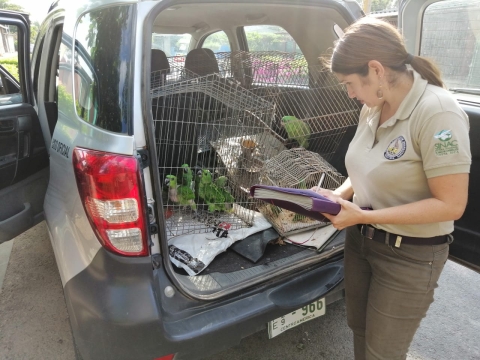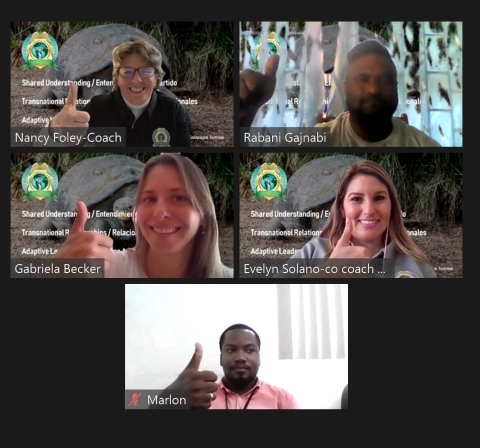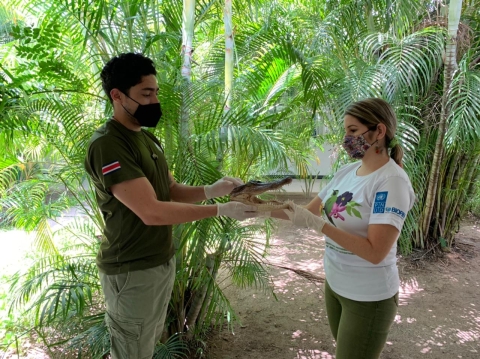Evelyn Solano Brenes is the coordinator of the Wildlife Management and Conservation Program in the Guanacaste Conservation Area in Costa Rica. In September 2019, she graduated from the U.S. Fish and Wildlife Service’s International Conservation Chiefs Academy’s (ICCA) Cohort 6 and returned as a co-coach for the ICCA’s Cohort 7 in February 2021. We asked her to write about her ICCA experience and the importance of this academy.
The Benefits of Adaptive Leadership and the ICCA
When I went to the ICCA in 2019, I expected to learn more about wildlife trafficking and investigative techniques, but I soon realized this course was different and much more – it also taught me a lot about myself!
Photo by USFWS
It was a wonderful experience to analyze myself and explore new ways of working together with my colleagues, our institutions, and communities. Throughout the course, I learned to reflect, pause, and always ask what I can do better.
My experience at the ICCA provided the best training I have received for both my professional and personal development. It is a program that invites the participants from day one to explore themselves and to open their minds to new realities and ways of thinking and doing things. On the job, we constantly get trained in science and our disciplines, but never before had I experienced anything like this. It allowed me to go deep in my mind and heart and ultimately expand what I bring to my job.
One of the most valuable parts of the course was the ability to exchange experiences with other colleagues. By sharing lessons learned and implementing an adaptive leadership approach, we generated proposals to address common challenges and more effectively combat wildlife trafficking. At the same time, it allowed us to build alliances between members and countries that led to the creation of a regional network.
Working to support a team of professionals from the United Sates with a track record in conservation, law enforcement, and leadership allowed me to strengthen my capacity in course planning, learning methodologies, and group management. I also made a lot of new friends in my cohort. The coaches and instructors were very approachable and always willing to help.
My Experience as a Co-coach
In 2021, I was called upon to participate as a co-coach at the Service’s first Virtual-International Conservation Chiefs Academy (V-ICCA). The course was presented to South American countries with participants from Bolivia, Brazil, Colombia, Ecuador, and Guyana.
Participating both as a student and then as a co-coach was an honor for me. Being able to contribute my educational and practical experience to the learning of other students, who like me face adaptive challenges in conserving wildlife in their respective countries, was truly inspiring.
The objectives of my participation as a co-coach were to:
- Convey the importance of this course
- Reinforce environmental protection actions in Latin America
- Urge them to take advantage of what they learn
- Help address the problem of wildlife trafficking in a novel and comprehensive way
- Help motivate participants to generate synergy between countries.
This was a wonderful experience for me. As a co-coach, I was able to contribute by sharing my knowledge and experience concerning wildlife trafficking, dealing with complex situations, and applying adaptive leadership in my daily duties.
Adaptive Leadership Applied to Field Work
The Guanacaste Conservation Area, where I work, is a UNESCO-Humanity Natural Heritage Site. My agency conserves and protects the region's flora and fauna and promotes the sustainable use of our natural resources. In addition to regulating the legal wildlife trade, we work in conjunction with other departments to prevent wildlife crime – to stop the illegal hunting, possession, and extraction of flora and fauna, and the trafficking of wildlife.
When I returned home to Costa Rica, I felt ready and energized to take on our adaptive challenges and I hung the principles on the walls to remind me every day. I took on the task of implementing the acquired knowledge and the principles of adaptive leadership and systems thinking in all areas of my work and above all in addressing the problem of wildlife trafficking at our borders. I worked with my colleagues to develop a plan to prevent and control trafficking at the border with Nicaragua in collaboration with other institutions such as the Costa Rican border police, civil police, and coast guard. We are engaging others to let them know what the problem is, expanding work, and doing enforcement operations where we have had several important seizures.
We are also engaging with staff at the Liberia International Airport in Guanacaste. In some of wildlife trafficking cases that have occurred at the airport, we have had the support of Service wildlife inspectors and special agents and U.S. Customs and Border Protection officers who have provided us with information for the cases. Efforts to build relationships have been well received and our collaboration and partnerships to protect wildlife and detect and disrupt wildlife trafficking are growing.
Since graduating from the ICCA in 2019, I have worked hard to develop relationships with police departments in my own region to improve our detection and seizure rate of illegal wildlife at the border. While serving as a co-coach during the V-ICCA, I not only experienced the challenges of being a first-time assistant coach, but I also got to actively implement what I have learned throughout my ICCA training in a real-world work situation that unfolded at same time as the virtual academy. One afternoon after co-coaching, I gave a presentation about wildlife trafficking to a group of 40 new police officers in my region. I also presented to the border police, the airport’s Operational Support Group, and officers from other police departments who work in the region. Those presentations led to the initiation of a special operation to prevent and control environmental crimes that began on the Friday after the V-ICCA ended.
Personally, I am implementing what the ICCA instructors and coaches taught me and noticing the adaptive challenges of my work, such as how to manage the stress that comes with being a conservation law enforcement officer and being a woman leader, which is not always well received. Also, I am working to not be the authority, but to be part of the team and lead to accomplish a goal we all have.
International Network of Support
Even the toughest challenges can be taken on when we share a common purpose and keep working to advance. The ICCA has been very beneficial to me and my team, and I am thankful for the experience.
I am profoundly grateful to the program, its directorate, and the team of ICCA instructors for the exceptional training, which has undoubtedly helped me solve wildlife cases in my region. In addition, I feel like I am part of an international conservation law enforcement family that provides me a network of support and a platform to instruct others like me who fight every day with creativity and passion to protect natural resources for the future. This course inspires and challenges all of us to be better people.





